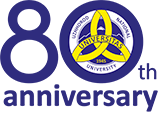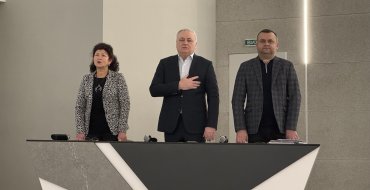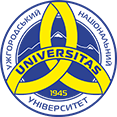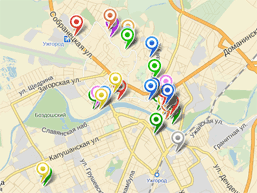Thanks to initiative students, the building of the Faculty of Medicine has become accessible to people with disabilities
In April, the ‘Ideaton’ event was held in Uzhhorod, where three students of our university proposed their concept of improving the accessibility of the medical faculty building and won a grant for its implementation.
The issue of accessibility and barrier-free accessibility is always relevant, but it is especially acute now - in times of war. The historical status of the Faculty of Medicine building requires prior approval and regulation of any repair work. In this regard, there are difficulties in installing appropriate means of transport, such as a ramp. However, our active and proactive young people have found a solution. Second-year medical students Kateryna Shleienkova, fourth-year student Vitalii Luts, and master's student of the Faculty of Tourism and International Communications Yuliia Zhynenko proposed their project solution at a competition and won a grant from sponsors.

The presentation of the stair lift was attended by the Rector of UzhNU Volodymyr Smolanka: ‘We understand that people with disabilities have certain challenges they have to face. Therefore, in order to make access equal for everyone, to make it barrier-free, we are implementing a number of projects aimed at helping students. One of these events was initiated by students today. It was implemented with the support of the NGO Nehemiah. This is a stair lift for the Faculty of Medicine. In modern buildings, access is easier than in historical buildings, like this one, built in the 20s of the twentieth century. Of course, these things were not foreseen there. That's why a mobile lift or crawler escalator like this is so important. A student can drive up, call the attendant and, accordingly, use the crawler escalator to go up. This is one of the small bricks in a number of projects and concepts of barrier-free access for all higher education students.’
The "Nehemiah" NGO supported this concept as part of an ideation competition held at Uzhhorod National University. A large number of proposals were submitted to the competition, of which seven won, including an initiative group of UzhNU students.

Vira Sheles, acting head of the UNHCR field office in Zakarpattia and Ivano-Frankivsk regions, shared her impressions: ‘I am very pleased that active students have taken up such an important topic, as our focus was on inclusion. They went deeper into this topic and presented it not just as a disability issue, but showed it from the perspective of involving society and people in the processes of life. We say that education is an important right because it is necessary for a person to be in society and have the opportunity to develop. Therefore, the way the students presented this project, the way they saw the steps to make the Faculty of Medicine more accessible to people with disabilities who need to exercise their right to study, impressed us.’
At the event, the management and staff of the Faculty demonstrated how the stair lift works. In order to get inside, you need to press the call button, which is clearly highlighted against the background of the building, and the inscription is also duplicated in Braille, after which an employee will come out and help.

Acting Dean of the Faculty of Medicine Oleh Devinyak said: ‘Such implementations are important because, unfortunately, the number of people with disabilities as a result of the war is increasing. And we are aware that they will need to change their concept, their place of work, their lifestyle. And these people need help and support from the public. We need to give them the opportunity to study, re-profile, and get a new education in order to take their place in society. That is why, in addition to making the building more accessible, the faculty also develops short, less formal educational programmes to teach people to understand medical limitations, first aid principles and emergency procedures. That is, everything we can share as doctors to support and help.’














